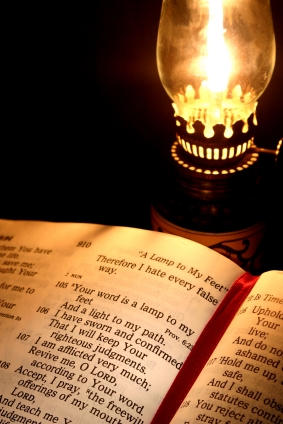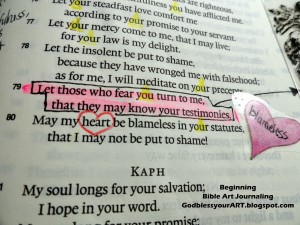I wait quietly before God, for my victory comes from him. He alone is my rock and my salvation, my fortress where I will never be shaken. (Psalm 62:1-2)
 Life often pulls us in opposite directions. Verse 2 in this Psalm is actually repeated by David in verse 6. And reading it, you may get the sense that David is patiently waiting on the LORD, just being still. But between verse 2 and 6 are verses 3 and 4, and here we discover the context:
Life often pulls us in opposite directions. Verse 2 in this Psalm is actually repeated by David in verse 6. And reading it, you may get the sense that David is patiently waiting on the LORD, just being still. But between verse 2 and 6 are verses 3 and 4, and here we discover the context:
So many enemies against one man— all of them trying to kill me. To them I’m just a broken-down wall or a tottering fence. They plan to topple me from my high position. They delight in telling lies about me. They praise me to my face but curse me in their hearts.
Think about this neck-wrenching turn David made—from peace and worship to murder and mayhem. Now granted, David was a godly king, and it seemed that somebody always had it out for him, including members of his own family! Then add border disputes, evil empires, jealousy in the courts, and it’s amazing that David got any God-time at all.
Now we don’t have nearly the notoriety, but we should still expect similar evils: Indeed, all who desire to live godly in Christ Jesus will be persecuted. (2 Timothy 3:12) There you go—something we have in common with David. But realize there is one greater with whom we have something in common: Jesus.
If the world hates you, remember that it hated me first. The world would love you as one of its own if you belonged to it, but you are no longer part of the world. I chose you to come out of the world, so it hates you. (John 15:18-19)
So gather up your expectations and realize that persecution and hatred will be coming, just because we love Jesus. But because of that love we will, as David said, have victory.
But in all these things we overwhelmingly conquer through Him who loved us. (Romans 8:37)
Remember David’s context: regardless of the turmoil, regardless of the suffering, regardless of wicked words and evil actions—even in the midst of all these—we must turn our attention and worship to Him:
My victory and honor come from God alone. He is my refuge, a rock where no enemy can reach me. O my people, trust in him at all times. Pour out your heart to him, for God is our refuge. (Psalm 62:7-8)

 I don’t want to draw an parallels between Israel as a nation and any other nation today or even in the ancient world. Israel has been and is unique. But the parallel we can draw is about the people He has chosen as an inheritance. Paul tells us in Romans:
I don’t want to draw an parallels between Israel as a nation and any other nation today or even in the ancient world. Israel has been and is unique. But the parallel we can draw is about the people He has chosen as an inheritance. Paul tells us in Romans:
 I had a chat with a friend at work and we were talking about the word hope. And as is often the case, our culture has diluted the meaning of the word. It now has to do with wishes, wants, and desires—things which may or may not happen. And I suppose that makes sense. If your hope is based upon the character and nature of someone (or something) other than God, then hope is little more than a crap shoot.
I had a chat with a friend at work and we were talking about the word hope. And as is often the case, our culture has diluted the meaning of the word. It now has to do with wishes, wants, and desires—things which may or may not happen. And I suppose that makes sense. If your hope is based upon the character and nature of someone (or something) other than God, then hope is little more than a crap shoot. There are two very important words in this verse: dwell and abide. The word dwell in Hebrew is used for a lot of words. It can be translated as some form of inhabit, sit, stay, remain, and even married. Do you get the impression that dwelling in the shelter of the Most High is a place where not only do you want to stay, but it is a place where you are welcome. And it is a place that is close, maybe even home.
There are two very important words in this verse: dwell and abide. The word dwell in Hebrew is used for a lot of words. It can be translated as some form of inhabit, sit, stay, remain, and even married. Do you get the impression that dwelling in the shelter of the Most High is a place where not only do you want to stay, but it is a place where you are welcome. And it is a place that is close, maybe even home. spread them out over a number of days, pull Scripture from all over the Bible to show how consistent and clear God’s Word is. But in the above six verses, which are the last verses of this Psalm, there is just one simple thing to learn.
spread them out over a number of days, pull Scripture from all over the Bible to show how consistent and clear God’s Word is. But in the above six verses, which are the last verses of this Psalm, there is just one simple thing to learn. For those in Philippians 2 who must bow and confess, so it will be for the enemies of God in Psalm 83. It’s too late; they will be dead, but they will know who the LORD is. No chance to repent. No chance to believe and confess. No chance to find forgiveness.
For those in Philippians 2 who must bow and confess, so it will be for the enemies of God in Psalm 83. It’s too late; they will be dead, but they will know who the LORD is. No chance to repent. No chance to believe and confess. No chance to find forgiveness. With every bone in my body. When I looked up the word for bone in the Hebrew, it meant…bone. But it also means (as secondary translations) body, limbs, self and strength. That’s a pretty significant commitment for praise. And when you add the word every, which is also translated as whole, all, completely, anything, whatever and whenever, the praise become totally consuming.
With every bone in my body. When I looked up the word for bone in the Hebrew, it meant…bone. But it also means (as secondary translations) body, limbs, self and strength. That’s a pretty significant commitment for praise. And when you add the word every, which is also translated as whole, all, completely, anything, whatever and whenever, the praise become totally consuming. There are two words in this verse which are either lost, or come at a premium, depending on your worldview. They are true and trust. And trust cannot exist without truth. So let’s tackle true first.
There are two words in this verse which are either lost, or come at a premium, depending on your worldview. They are true and trust. And trust cannot exist without truth. So let’s tackle true first. What does it mean that the Word of the Lord holds true? Some of the definitions of true are straight and level. God will go great lengths to speak to us: A voice is calling, “Clear the way for the LORD in the wilderness; make smooth in the desert a highway for our God. Let every valley be lifted up, and every mountain and hill be made low; and let the rough ground become a plain, and the rugged terrain a broad valley; then the glory of the LORD will be revealed, and all flesh will see it together; for the mouth of the LORD has spoken.” (Isaiah 40:3-5) It should be noted these were the words quoted by John the Baptist as he began his ministry, soon to proclaim the coming of Christ. Things would be level, straight and plain; then glory of the Lord would be revealed—Jesus would be revealed.
What does it mean that the Word of the Lord holds true? Some of the definitions of true are straight and level. God will go great lengths to speak to us: A voice is calling, “Clear the way for the LORD in the wilderness; make smooth in the desert a highway for our God. Let every valley be lifted up, and every mountain and hill be made low; and let the rough ground become a plain, and the rugged terrain a broad valley; then the glory of the LORD will be revealed, and all flesh will see it together; for the mouth of the LORD has spoken.” (Isaiah 40:3-5) It should be noted these were the words quoted by John the Baptist as he began his ministry, soon to proclaim the coming of Christ. Things would be level, straight and plain; then glory of the Lord would be revealed—Jesus would be revealed. My soul is among lions; I must lie among those who breathe forth fire, even the sons of men, whose teeth are spears and arrows and their tongue a sharp sword. Be exalted above the heavens, O God; let Your glory be above all the earth. They have prepared a net for my steps; my soul is bowed down; They dug a pit before me. (vs. 4-6)
My soul is among lions; I must lie among those who breathe forth fire, even the sons of men, whose teeth are spears and arrows and their tongue a sharp sword. Be exalted above the heavens, O God; let Your glory be above all the earth. They have prepared a net for my steps; my soul is bowed down; They dug a pit before me. (vs. 4-6)
 Context is critical when it comes to determine the actual meaning of a scriptural passage, and how it is to be applied. I love getting wrapped up in individual words and their meanings and nuances, but if I lose sight of the context, then I commit a grave error as described in the idiom: “Can’t see the forest for the trees”, which reminds us that we need perspective, we need context.
Context is critical when it comes to determine the actual meaning of a scriptural passage, and how it is to be applied. I love getting wrapped up in individual words and their meanings and nuances, but if I lose sight of the context, then I commit a grave error as described in the idiom: “Can’t see the forest for the trees”, which reminds us that we need perspective, we need context.